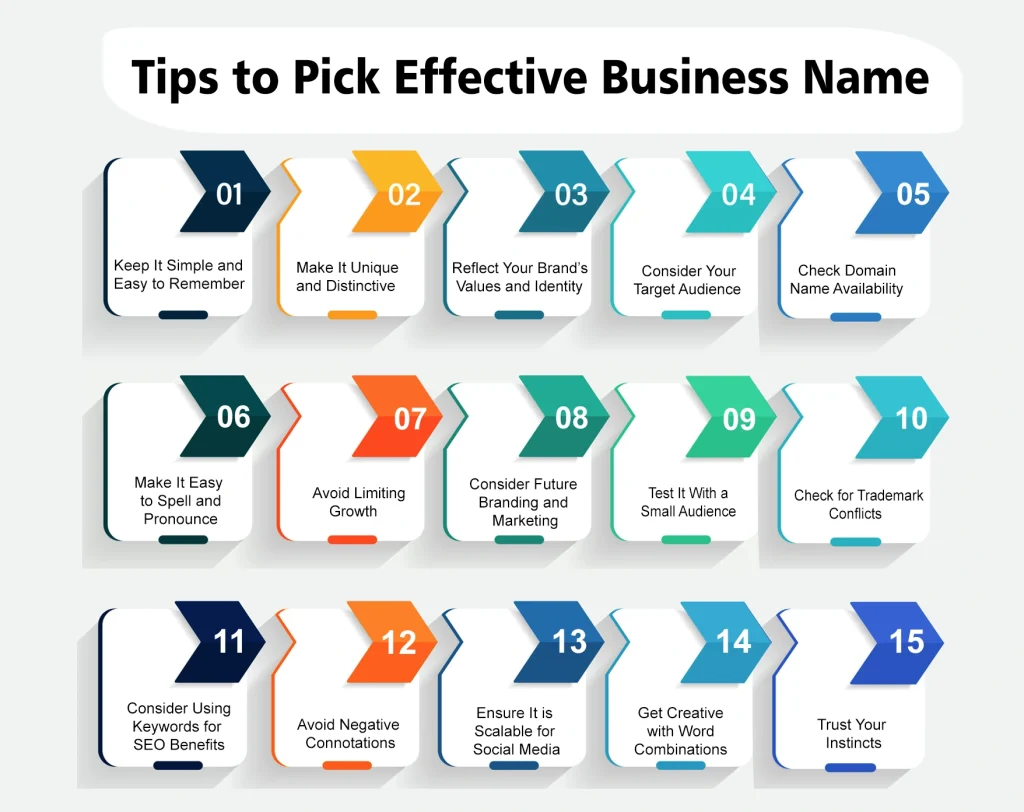15 Great Tips to Pick Effective Business Name

A business name is worth the whole success as it sets the tone for your identity, influences, and customer perception. Additionally, it plays a key role in marketing. A well chosen name can make your business memorable, while a poor one may create confusion or fail to attract customers.
Most people who are on the verge of launching their enterprise are stuck at this stage. However, there is nothing to worry about as below are 15 expert tips to help you select an effective business name. Just head on to them and start your journey with an impactful brand identity.
15 Tips to Pick Effective Business Name
In the under section, I have explained some of the best strategies you can follow and implement to pick an effective business name. I also struggled a lot when it was my turn to name my brand.
However, the tactics mentioned below are the ones that helped me and I have described them below as well to let you people enjoy some serious comfort in this crucial task.

1. Keep It Simple and Easy to Remember
A good business name should be easy to spell, pronounce, and remember. Complicated names can confuse potential customers and make marketing difficult. Shorter names often work better because they are more memorable and easier to type into search engines.
Example
- Good: Nike, Apple, Uber
- Bad: Xhynotek Solutions (hard to spell and remember)
2. Make It Unique and Distinctive
Your business name should stand out from competitors. A unique name prevents confusion and potential legal issues related to trademarks. You should conduct research to ensure your chosen name is not already in use.
How to Check for Uniqueness:
- Search business directories like Google My Business
- Check social media handles
- Look for registered trademarks on official databases
3. Reflect Your Brand’s Values and Identity
The business name should give an idea of what your business is about. It should align with the vision, values, and personality of your brand. Customers should get a sense of your industry and services just by hearing the name and seeing its logo.
Example:
- Eco Friendly Brand: GreenEarth Solutions
- Luxury Brand: Royal Elegance Designs
4. Consider Your Target Audience
Think about who your customers are and what appeals to them. A business name that works for a high end jewelry brand might not be suitable for a tech startup. Your name should connect emotionally with your audience.
Example:
- A fun and catchy name for a kids’ clothing store: Tiny Tots
- A professional and serious name for a law firm: Sterling Legal Advisors
5. Check Domain Name Availability
Since businesses need an online presence, you must ensure that the domain name for your business is available. Ideally, try to get a “.com” domain, as it is the most popular and credible extension.
Tools to Check Domain Availability:
- Namecheap
- GoDaddy
- Bluehost
6. Make It Easy to Spell and Pronounce
If your customers can not pronounce your business name correctly, they may not remember it or recommend it to others. Therefore, you have to avoid unusual spellings unless they have a strong branding purpose.
Example:
- Hard to pronounce: Xquify
- Easy to pronounce: ClearFlow
7. Avoid Limiting Growth
Your brand name should be broad enough to allow for expansion. When you avoid names that confine you to a single product, service, or location, you can pave the way for scalability across the globe. Further, find the business name with a strong message to build trust with your audience.
Example:
- Too Limiting: New York Cupcakes (limits expansion beyond New York and cupcakes)
- Better: Sweet Treats Bakery (allows for more locations and products)
8. Consider Future Branding and Marketing
A great business name should be adaptable for future marketing campaigns, logos, and slogans. It should also look good visually when placed on business cards, websites, and advertisements.
With this tactic, you will be able to attract more audience and secure long term benefits in this competitive marketplace. Business name generator tools are available on the web for this purpose.
9. Test It With a Small Audience
Before finalizing your business name, test it with a small group of people. Gather feedback on how they perceive it and whether they find it appealing or confusing.
Ways to Test a Name:
- Conduct social media polls
- Ask family, friends, or potential customers
- Use online forums or focus groups
10. Check for Trademark Conflicts
A business name that is already trademarked can lead to legal problems. Before registering your business, it would be best if you check for trademarks to ensure no other company owns the name.
Where to Check Trademarks:
- U.S. Patent and Trademark Office (USPTO)
- Intellectual Property Office of your country
11. Consider Using Keywords for SEO Benefits
If you plan to have a strong online presence and start a blog, incorporating keywords related to your industry can help you with search engine rankings. However, don’t make it too generic.
Example:
- SEO friendly but unique: Fresh Bites Catering (for a food business)
- Too generic: Best Food Services
12. Avoid Negative Connotations
Next, you also have to make sure that your business name does not have unintended meanings in other languages or cultures. Words that sound offensive or have embarrassing translations can hurt your brand.
Example of Branding Fails:
- A car named “Nova” failed in Spanish-speaking countries because “No va” means “doesn’t go.”
- A brand named “Pee Cola” in Ghana confused English speakers.
13. Ensure It is Scalable for Social Media
Your business name should be available as a social media handle across major platforms like Facebook, Instagram, X, and LinkedIn. This strategy allows you to bring consistency to your brand mentions and build trust with customers.
Tools to Check Social Media Availability:
- Namechk
- Atom (formerly Squadhelp)
14. Get Creative with Word Combinations
If common names are already taken, consider blending words, using alliteration, or making up a completely new word. This can make your brand stand out.
Creative Name Ideas:
- Spotify: Mix of “spot” and “identify“
- Netflix: Combination of “internet” and “flicks“
- Instagram: A blend of “instant” and “telegram“
15. Trust Your Instincts
At the end of the day, your business name should feel right to you. If it aligns with your brand and resonates with your vision, go for it. A name you believe in will help you build a stronger brand.
Just trust your instincts and keep the values and services of your brand in view. Ultimately, you can come up with a name that delivers all the desired outcomes to your brand.
Final Thoughts
These are the details about the effective tips to generate a compelling business name. I have explained all the tactics that I implemented personally when naming my brand. Now, it’s your turn to get benefits from them as all of them are present in the guide above.
While not all these strategies may resonate with your preferences, it would be best to perform comprehensive research and use tools to find a name. Next, you should trust your instincts and focus on the brand values before making a final decision.




